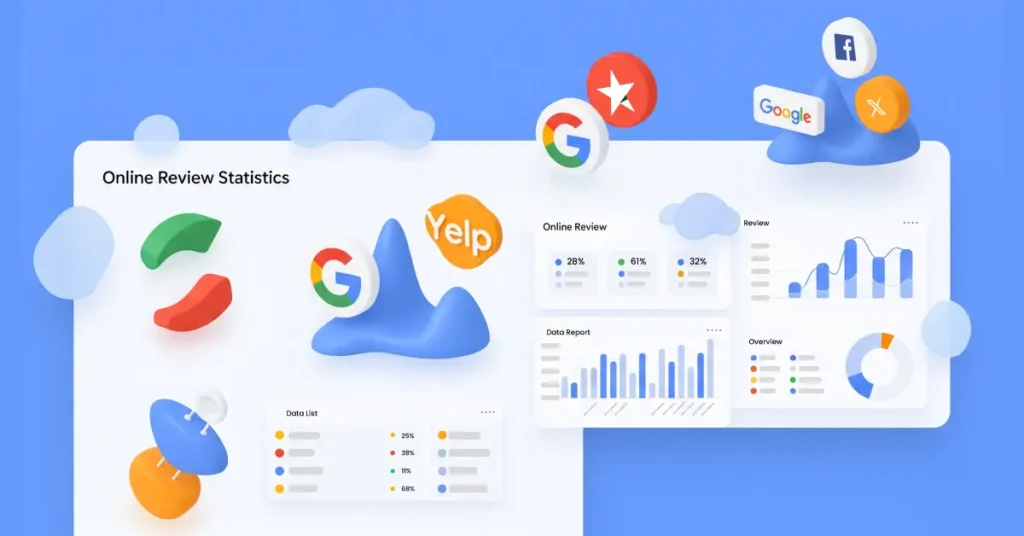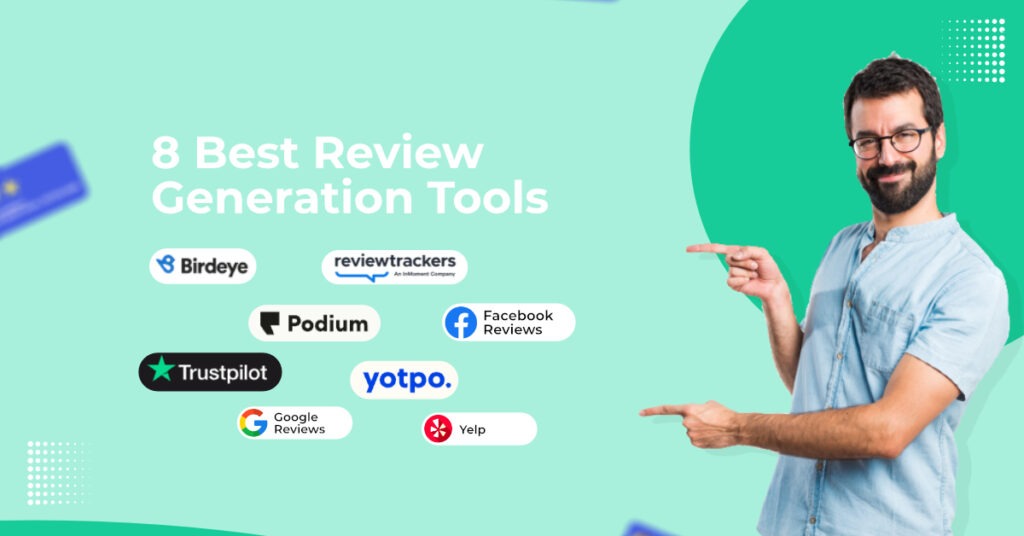Last Tuesday, I got a call from a frustrated roofing contractor in Dallas. Despite 15 years of excellent work and happy customers, he was losing jobs to newer companies with flashy websites. His biggest competitor, who’d been in business for just 3 years—was booking twice as many customers.
The difference? His competitor understood something he didn’t.
When homeowners need contractors, 80% start their search online. They type phrases like “roofing contractors near me” or “emergency plumber” into Google. The businesses that appear first win the jobs. The ones that don’t exist online? They don’t even get a chance to compete.
This is exactly why mastering local SEO for contractors isn’t optional anymore, it’s survival. After helping local businesses across multiple industries dominate their regional markets, I’ve cracked the code on what actually works in 2025.
Let me share these strategies with you.
What is Local SEO Mean for Contractors?
Local SEO is the process of optimizing your online presence to appear when potential customers search for services in your area. When someone types “plumber near me” or “roofing contractors in Chicago,” you want your business showing up first.
Think of it as your online store. Just like you’d put up a sign outside your physical location, local search engine optimization helps Google understand what services you offer and where you serve customers.
The goal? Turn those “near me” searches into phone calls, website visits, and paying customers. It’s about being found by people who are actively looking for exactly what you do—right when they need it most.
Key Benefits of Local SEO for Contractors
After working with contractors across different trades, I’ve seen firsthand how local SEO transforms struggling businesses into thriving operations. Here’s what you can expect:
- Higher Quality Leads – When someone searches “emergency HVAC repair near me” at midnight, they’re not just browsing; they need help now. These high-intent searches convert into paying customers because you’re reaching people at the exact moment they need your services.
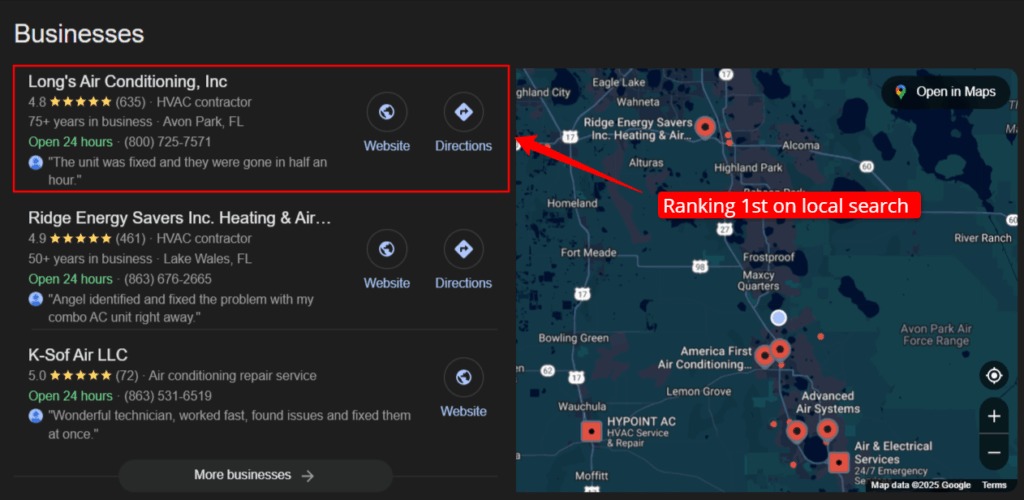
For instance, this business ranks 1st on the Google for ’emergency HVAC repair near Avon Park, Florida.’ It means the chances of a customer visiting their profile and contacting them are very high.
- Cost-Effective Marketing – Unlike pay-per-click ads that drain your budget the moment you stop paying, local SEO keeps working 24/7. I’ve watched contractors reduce their advertising costs by 60% while doubling their lead volume through strategic optimization.
- Builds Trust and Credibility – Appearing at the top of Google searches signals authority. Potential customers automatically trust businesses that rank higher, especially when your Google Business Profile shows genuine reviews and professional photos of your work.
- Targets Your Service Areas – Local SEO for general contractors lets you focus on specific neighborhoods where you want to work. No more wasting time on leads from areas outside your service radius.
- Long-Term Business Growth – While other marketing strategies require constant spending, a well-optimized local presence becomes a valuable business asset that grows stronger over time.
Top Keywords Customers Use to Find Contractors Nearby
Understanding what potential customers type into Google helps you optimize your website and capture more leads. After analyzing search data from hundreds of contractor campaigns, here are the most valuable keywords I’ve discovered:
| S.No | Keywords | Search Intent |
| 1 | [Service] contractors near me | High-intent local search ready to hire |
| 2 | Emergency [service] repair | Urgent need, immediate hiring decision |
| 3 | Best [service] company in [city] | Comparison shopping, quality-focused |
| 4 | [Service] contractors [city name] | Local search with specific location |
| 5 | Reliable [service] contractors | Trust-focused, quality over price |
| 6 | [Service] installation [city] | Project-specific, planning phase |
| 7 | Licensed [service] contractors | Safety-conscious, credential verification |
| 8 | [Service] repair services nearby | Problem-solving, immediate need |
| 9 | Affordable [service] contractors | Budget-conscious, price comparison |
| 10 | [Service] contractors reviews | Research phase, reputation checking |
Here’s the thing: These keywords represent different stages of the customer journey. Emergency searches convert fastest, while review-based searches need more nurturing. I optimize my clients’ websites to capture leads at every stage of this process.
7 Steps to Do Local SEO for Contractors to Get More Sales
Here are 7 ways you can use to do local SEO of your contractor business and start attracting more qualified leads from your service areas:
1. Optimize Your Google Business Profile
Your Google Business Profile is your most powerful tool for local SEO. When I audit contractor websites, I find that 80% have incomplete or poorly optimized profiles. This costs them thousands in lost revenue.
Here’s exactly how I optimize profiles for maximum visibility:
Start with the Basics:
First, claim your Google Business Profile if you haven’t already. Go to business.google.com and search for your business name. If it exists, claim it. If not, create a new listing.
Choose the Right Business Category:
This is crucial. Your primary category should match exactly what customers search for. For example:
- Use “General Contractor” not “Construction Company”
- Use “Roofing Contractor” not just “Contractor”
- Use “HVAC Contractor” for heating and cooling services
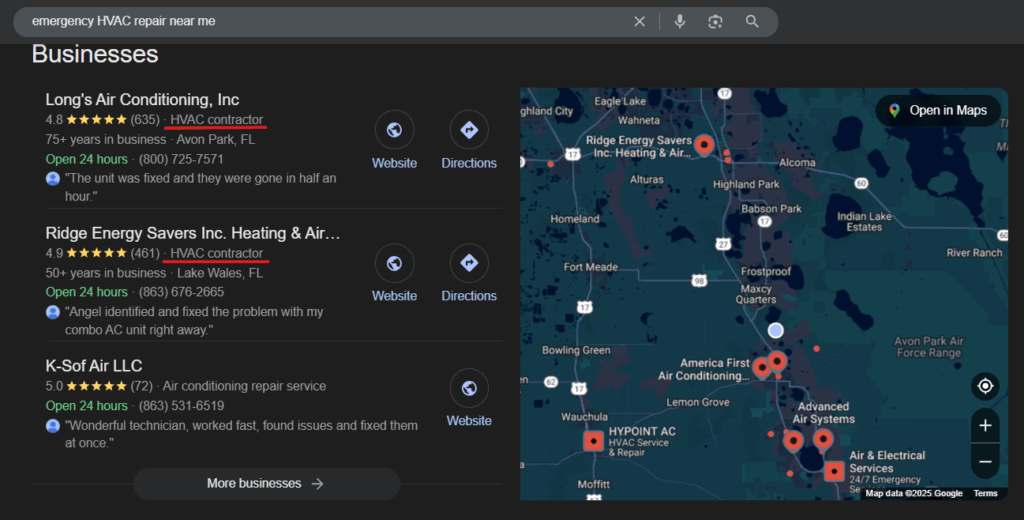
Google uses your primary category to determine when to show your business in search results.
Complete Every Section:
I never leave any field blank. Here’s what you must include:
- Business name (exactly as it appears on your website)
- Complete address with proper formatting
- Primary phone number (local area code works best)
- Website URL
- Business hours (including holiday hours)
- Service areas (be specific about cities you serve)

For example, look at ‘Long’s Air Conditioning’ and see how clearly, they have shown crucial details such as website links, phone number, services areas, and more.
Write a Compelling Business Description:
Your business profile description has a character limit of 750 characters; however, Google only shows the initial 250 characters. So, it becomes important to show the main details first, like in the screenshot above. I include:
- What services you provide
- How long you’ve been in business
- What makes you different from competitors
- Your service areas
Example: “Licensed general contractors serving Chicago for 15 years. We specialize in kitchen remodeling, bathroom renovations, and home additions. Family-owned business with 500+ satisfied customers and an A+ BBB rating.”
Add High-Quality Photos:
Photos get 42% more requests for directions and 35% more clicks to your website. Upload:
- Professional exterior and interior shots of your work
- Before and after project photos
- Team photos showing your crew in action
- Photos of your work vehicles and equipment
Use Google Posts Regularly:
I post updates at least twice per week. Share:
- Recent project completions
- Special offers or seasonal services
- Company news or certifications
- Tips for homeowners
Enable Messaging and Q&A:
Turn on messaging so customers can contact you directly through Google. Also, monitor and respond to questions in the Q&A section. This shows Google that you’re actively managing your profile.
The result? My clients typically see a 40-60% increase in map pack visibility within 60 days of optimization.
2. Conduct Keyword Research to Build a Strong Content Strategy
Most contractors guess what their customers search for—and they guess wrong. After analyzing thousands of search queries, I’ve discovered that successful contractors focus on what I call “money keywords”—terms that lead directly to phone calls and project bookings.
Start with Your Core Services:
First, list every service you actually perform. Don’t overthink this. Write down:
- Kitchen remodeling
- Bathroom renovation
- Roof repair
- HVAC installation
- Emergency plumbing
Now, here’s the key, customers don’t search for generic terms like “construction.” They search for specific problems they need solved.
Use Google’s Free Keyword Tools:
I rely on three free methods that work better than expensive software:
Google Autocomplete Method:
Type your service into Google and see what appears. For example, type “kitchen remodel” and Google suggests:
- Kitchen remodel ideas
- Kitchen remodel cost
- Kitchen remodel contractors near me
- Kitchen remodel timeline

These suggestions show you exactly what people search for.
Google’s “People Also Ask” Section:
Search for your main service and scroll to the “People Also Ask” boxes. I’ve found goldmine keywords here like:
- “How much does kitchen remodeling cost?”
- “How long does a bathroom renovation take?”
- “What permits do I need for home addition?”

Search Console Data Mining:
If you have an existing website, connect it to Google Search Console (it’s free). Go to the “Queries” section to see what searches already bring people to your site. Often, you’ll discover you’re ranking on page 2 or 3 for valuable keywords you didn’t even know about.
Focus on Local Intent Keywords:
Here’s what separates successful contractors from struggling ones: they target location-specific keywords. Instead of competing for “kitchen remodeling” (impossible to rank for), they target:
- Kitchen remodeling contractors Dallas
- Bathroom renovation services Chicago
- Emergency roof repair Miami
Identify High-Intent vs. Research Keywords:
I organize keywords into two buckets:
High-Intent Keywords (ready to hire):
- Emergency plumber near me
- Roofing contractors Dallas
- Kitchen remodel quotes
Research Keywords (still learning):
- Kitchen remodel ideas
- How much does roof replacement cost
- Bathroom renovation timeline
Create Your Content Strategy:
For high-intent keywords, create service pages on your website. For research keywords, write helpful blog posts that establish your expertise.
Here’s my proven formula:
- Homepage: Target “General contractors [your city]”
- Service pages: “[Specific service] contractors [your city]”
- Location pages: “General contractors [nearby city]”
- Blog posts: Answer common customer questions
Validate Your Keywords:
Before creating content, I check three things:
- Do people actually search for this?
- Can I realistically rank for it?
- Will ranking for this keyword bring paying customers?
The sweet spot? Keywords with decent search volume, manageable competition, and clear commercial intent.
Use Keyword Planner tool to check the search volume.

Remember, you don’t need hundreds of keywords. I typically focus on 10-15 high-value terms that directly relate to services that make you money.
3. Create Location-Specific Content for Your Website
Here’s where most contractors leave money on the table. They create one generic page saying, “We serve the greater metro area” and wonder why competitors in specific neighborhoods outrank them.
I’ve learned that Google rewards businesses that prove they truly understand and serve specific communities. When I help contractors create location-specific content, their local rankings typically jump 2-3 positions within 90 days.
The Power of Hyper-Local Pages:
Instead of one broad service area page, I create dedicated pages for each city or neighborhood you serve. Here’s why this works:
When someone in Plano, Texas searches “roofing contractors Plano,” Google wants to show businesses that specifically mention Plano—not companies that just list 50 cities in their footer.

How to Structure Your Location Pages:
I use this proven template for every location page:
Page Title: “[Your Service] in [City Name] – [Your Company]” Example: “Kitchen Remodeling in Frisco – Dallas Home Renovators”
Content Structure:
- Opening paragraph mentioning the specific city
- Why you love serving this community
- Local landmarks or neighborhoods you know
- Specific services popular in that area
- Local customer testimonials
- Your service area within that city
Make It Genuinely Local:
Don’t just swap out city names in the same template. I research each location and include:
- Local building codes or permit requirements
- Weather considerations (like hurricane-resistant roofing in Florida)
- Popular home styles in that area
- Local landmarks people recognize
- Nearby supplier relationships

Example of Effective Local Content:
Instead of: “We provide roofing services in McKinney.”
I write: “Serving McKinney homeowners for over 10 years, we understand the unique challenges of North Texas weather. From hail damage repairs common in the Historic Downtown district to energy-efficient upgrades popular in Stonebridge Ranch, our team knows McKinney’s diverse neighborhoods and housing styles.”
Create Service + Location Combinations:
For contractors offering multiple services, I create pages targeting:
- Kitchen remodeling in [City]
- Bathroom renovation in [City]
- Roofing contractors in [City]
- Emergency plumbing in [City]
This strategy works especially well for multi-location contractors who serve several cities.
Pro tip: Here’s how you can optimize for multiple locations
Internal Linking Strategy:
I connect location pages strategically:
- Link from your main service pages to location-specific versions
- Link between nearby location pages
- Create a comprehensive service areas page that links to all locations

Content That Builds Trust:
On each location page, I include:
- Photos of actual projects in that city
- Customer testimonials from local residents
- Your business license numbers for that area
- Local partnerships or supplier relationships
- Community involvement or sponsorships
Avoid These Common Mistakes:
Don’t create thin content pages with just an address and phone number. Google sees through this and won’t rank empty pages.
Don’t target locations you don’t actually serve well. If you charge extra travel fees or take longer to respond, don’t create a location page.
Don’t duplicate content across location pages. Each page needs unique, valuable information.
The Mobile-First Reality:
Since most customers search on mobile devices, I ensure every location page includes:
- Clear driving directions
- One-click calling buttons
- Service area maps
- Local contact information
Measuring Success:
I track rankings for location-specific keywords like:
- “[Service] in [City]”
- “[City] [service] contractors”
- “[Service] near [local landmark]”
Remember: quality beats quantity. Five well-crafted location pages outperform fifty generic ones every time.
4. Get Customer Reviews and Boost Rankings
Reviews are the secret weapon of local SEO for contractors. Businesses with 50+ positive reviews rank 3x higher than those with fewer reviews. But most contractors struggle to collect them consistently.
Why Reviews Matter?
Google uses reviews as trust signals. When customers see dozens of 5-star reviews, they call you instead of competitors. Reviews also directly boost your search rankings—I’ve watched contractors jump from page 2 to the map pack just by improving their review strategy.
The Solution:
This is where Krofile becomes a game-changer. Instead of manually chasing reviews across platforms, Krofile streamlines everything.
Krofile helps you:
- Collect reviews across all major platforms (Google, Yelp, Facebook, etc.)
- Create a complete digital business profile with phone numbers, maps, photos, menus, and booking links
- Use built-in AI optimization to do local SEO of your profile and rank higher in search results (like Gazz Godz)

My Proven Review Strategy Ask for reviews within 24-48 hours of project completion when customers are happiest. Use Krofile’s QR code/NFC tag to let customers scan and drop a review.
The Result? Contractors collecting reviews consistently see higher rankings, increased trust, and more referrals month after month.

Remember: one negative review among fifty positive ones won’t hurt you. But zero reviews definitely will.
5. Build Backlinks and Local Citations
Backlinks and local citations act like votes of confidence for your contractor business. The more quality “votes” you have, the higher Google ranks you in local search results.
What Are Local Citations?
Citations are online mentions of your business name, address, and phone number (NAP). They appear on directories, review sites, and local business listings. Consistent citations across the web tell Google that your business is legitimate and established.
My Strategic Approach:
I focus on two types of links that work best for contractors:
Local Backlinks:
- Chamber of Commerce memberships
- Local business associations
- Community sponsorships
- Partnerships with suppliers
Industry-Specific Backlinks:
- Builder association websites
- Trade organization directories
- Industry publication features
- Supplier partner pages
Free Citation Building:
Start with these high-impact directories:
- Yelp, Yellow Pages, Facebook Business
- Industry-specific sites (Angi, HomeAdvisor)
- Local chamber websites
- Better Business Bureau
Find more opportunities by searching “[your service] + [your city]” and looking for directory listings where competitors appear.
Quality Over Quantity:
Don’t buy cheap backlinks from Fiverr—they’ll hurt your rankings. Focus on legitimate, locally relevant websites that real customers use.
The result? Contractors with strong citation profiles typically see 25-40% better local search visibility within 3-6 months.
6. Optimize Your Contractor Website for Technical SEO
We earlier discussed creating local content and pages—now it’s time for technical SEO. Though it sounds complicated, I’ll break it down into simple steps that any contractor can handle.
Website Speed Matters:
Google prioritizes fast-loading websites. I use free tools like PageSpeed Insights to check site speed. Compress images, choose reliable hosting, and remove unnecessary plugins. Mobile users especially abandon slow sites quickly.
Mobile-First Optimization:
Over 70% of customers search for contractors on mobile devices. Your website must look perfect and load fast on phones. Test your site on different devices—if buttons are too small or text is hard to read, you’re losing customers.
Schema Markup (The Secret Weapon):
Schema markup is code that helps Google understand your business better. Use Schema generator tool and follow along. For contractors, I add:
- Local Business schema (business name, address, phone)
- Service schema (specific services you offer)
- Review schema (displays star ratings in search results)
- Organization schema (company details and credentials)
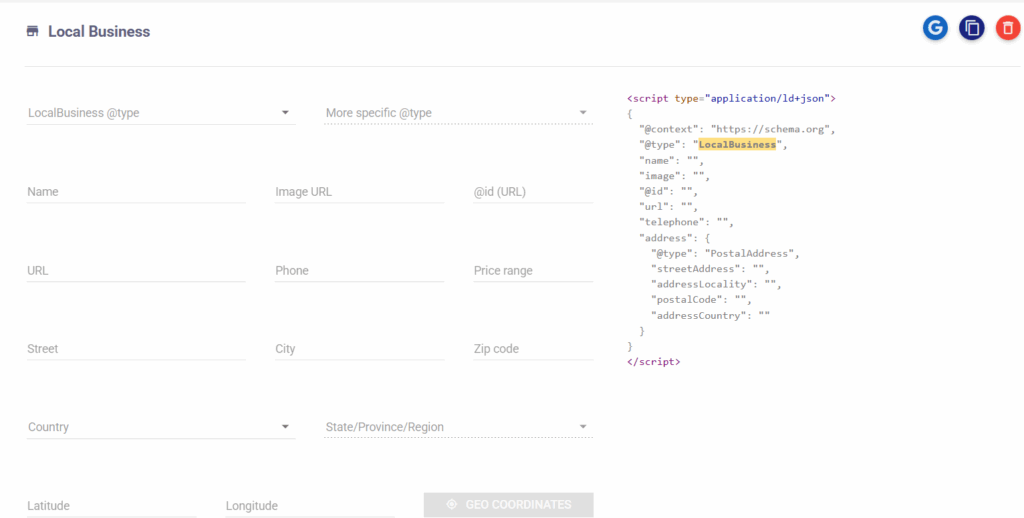
This code makes your business eligible for rich snippets—those enhanced search results with stars, phone numbers, and additional details that stand out from competitors.
SSL Certificate:
Ensure your website has “https://” not “http://”. This security certificate is required for trust and rankings.
Fix Broken Links:
Regularly check for dead links and fix them. Broken internal links hurt user experience and search rankings.
These technical improvements work behind the scenes to boost your local search visibility significantly.
7. Use SEO Tools to Analyze Performance
Finally, you can’t improve what you don’t measure. I use these five essential tools to track my clients’ local SEO success:
- Google Analytics – Shows website traffic, which pages customers visit most, and where your visitors come from. I track local traffic patterns to see which service areas drive the most leads.
- Google Search Console – Reveals which keywords bring people to your site and your average ranking positions. This free tool helps me identify opportunities to improve existing content.
- Google Business Profile Insights – Built into your Google Business Profile, it shows how customers find your listing, what actions they take (calls, directions, website visits), and photo performance.
- BrightLocal or Similar Local SEO Tools – Tracks your rankings for local keywords across different cities. I monitor “roofing contractors [city]” rankings to see progress over time.
- Your Phone and Call Tracking – The most important metric: phone calls from new customers. I recommend tracking which online sources generate the most qualified leads.
These tools help you understand what’s working and where to focus your efforts for maximum ROI.
5 Local SEO Tips That Contractors Must Use
Here are my proven local SEO tips to help you get immediate results:
1. Add “Near Me” Keywords Naturally – Include phrases like “contractors near me” and “emergency repairs near me” in your website content. These searches have exploded in recent years.
2. Use Your City Name in Page Titles – Every service page should include your city: “Kitchen Remodeling Dallas | Your Company Name.” This simple change can boost local rankings within weeks.
3. Post Weekly Google Business Updates – Share recent projects, team photos, or helpful tips every week. Active profiles rank higher than dormant ones.
4. Claim All Your Online Listings – Beyond Google, claim your business on Yelp, Facebook, Bing, and industry directories. Consistent information across platforms builds trust.
5. Optimize for Voice Search – People ask questions like “Who’s the best plumber near me?” Write content that answers these natural speech patterns.
These tips take minimal time but create compound results. Start with tip #2—it’s the fastest way to see ranking improvements.
5 Costly Local SEO Mistakes That Kill Contractor Leads
Now, its time for a crucial thing. Every business have some do’s and dont’s and here are my personal recommendations that you need to avoid at all costs:
1. Inconsistent NAP Information – Your name, address, and phone number must match exactly across all platforms. Even small differences like “St.” vs “Street” confuse Google and hurt rankings.
2. Keyword Stuffing Your Business Name – Don’t change your Google Business Profile name to “Joe’s Best Affordable Roofing Contractors Dallas.” Google will penalize or suspend your listing. Keep it natural.
3. Ignoring Negative Reviews – Leaving bad reviews unanswered signals search engines and customers about poor customer service. Always respond professionally; it shows potential customers you care about quality.
4. Creating Duplicate Location Pages – Don’t make identical pages with just city names swapped out. Google detects thin content and won’t rank these pages.
5. Targeting Too Many Service Areas – Claiming you serve a 100-mile radius dilutes your local authority. Focus on areas you can realistically serve well within reasonable response times.
Smart contractors complement their local SEO efforts with tools like Krofile.
Its comprehensive digital business profile and AI-powered optimization features help streamline your online presence, making it easier for customers to find and contact you across multiple platforms.




